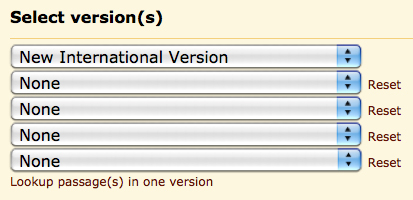NEWS RELEASE
News Release Archive | Newsroom
Thomas Nelson’s newest Bible translation is now offered for free on BibleGateway.com
GRAND RAPIDS, Mich. (February 13, 2013)—Celebrating its 20th year online, Bible Gateway kicks off 2013 by adding a new voice to its multiplying list of available Bible translations. “The Voice,” the newest Bible translation introduced to the market in late 2011 by Thomas Nelson, Inc. has received hundreds of endorsements from pastors, ministry leaders, Bible readers and faith seekers from all over the world.
“The Voice” experience has grown in popularity among active, private and cultural Christians everywhere. “The Voice” appeals to its audience with its unique dialogue written in screenplay format, allowing readers to step into the story of Scripture. The reaction by readers to this translation’s format was Bible Gateway’s initial attraction to bringing “The Voice” on board.
“We fell in love with the concept of ‘The Voice’ and its desire to reach the average reader,” said Rachel Barach, General Manager of Bible Gateway. “After noticing that overwhelming reviews were coming from scholars, pastors, ministry leaders and the everyday Bible readers, we knew it fit Bible Gateway’s mission.” Bible Gateway’s effort to provide free Scripture for all who want a better connection with God’s Word made “The Voice” a natural resource for the site.
Bible Gateway, one of the largest Christian websites in the world, currently hosts more than 160 different translations in over 70 different languages. As the site and mobile app continue to grow, Bible Gateway now averages over 100 million unique visitors per year.
“I was so impressed with ‘The Voice’ from the moment I first experienced it personally, ”said Chip Brown, senior vice president and publisher for HarperCollins Christian Publishing. “Everybody I know that reads ‘The Voice’ is passionate about how it brings the Scriptures alive for them. Readers on Bible Gateway have been asking for ‘The Voice’ and we are pleased to honor their request.”
Bible Gateway users can engage with “The Voice” in a number of ways to expand their Bible reading. In addition to making the full Bible text available on the site, “The Voice” will introduce several reading plans throughout the year, beginning on February 13th, in celebration of Lent and Easter. On February 21st, Bible Gateway will launch “The Voice” daily Bible verse newsletter for email subscribers.
“The Voice” is the result of a unique collaboration among scholars, pastors, authors, poets, musicians and other artists. The 120-member team translated each word of Scripture into a story that is faithful to the original Greek and Hebrew text, easier to understand and conveys the beauty and timelessness of Scripture.
For more information about “The Voice” and to download a free copy of the New Testament visit www.HearTheVoice.com.
___________________________________________________________________________________
About Bible Gateway BibleGateway.com, part of HarperCollins Christian Publishing, seeks to encourage Bible reading and Scriptural understanding among Bible readers everywhere. Celebrating 20 years online, Bible Gateway continues to offer free access to the Bible in more than 70 languages and 160 different translations. BibleGateway.com has grown to currently more than 14 million unique visitors per month. Please visit Bible Gateway at www.biblegateway.com.
About Thomas Nelson, Inc. Thomas Nelson, Inc., part of HarperCollins Christian Publishing, is a world leading provider of Christian content and has been providing readers with quality inspirational product for more than 200 years. The publishing group provides multiple formats of award-winning Bibles, books, gift books, cookbooks, curriculum and digital content, with distribution of its products in more than 100 countries. Thomas Nelson, is headquartered in Nashville, TN with additional offices in Plano, TX. For additional information, please visit www.thomasnelsoncorporate.com.










